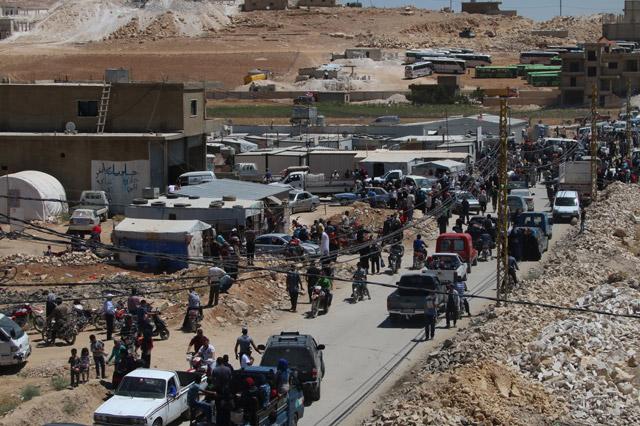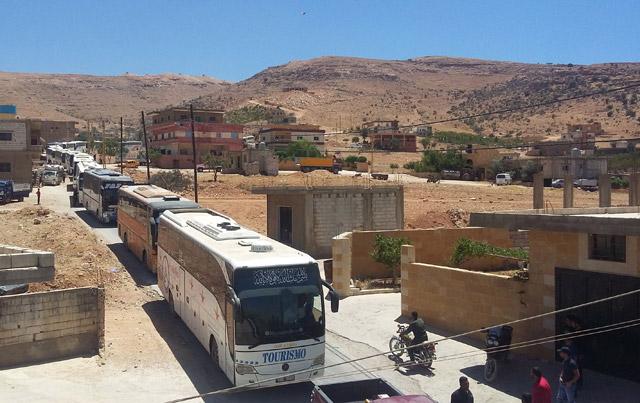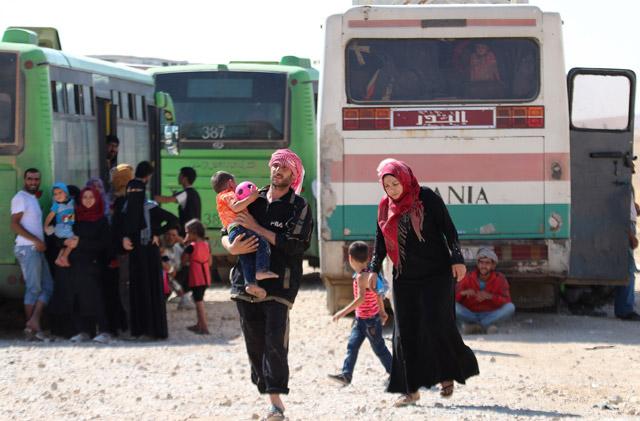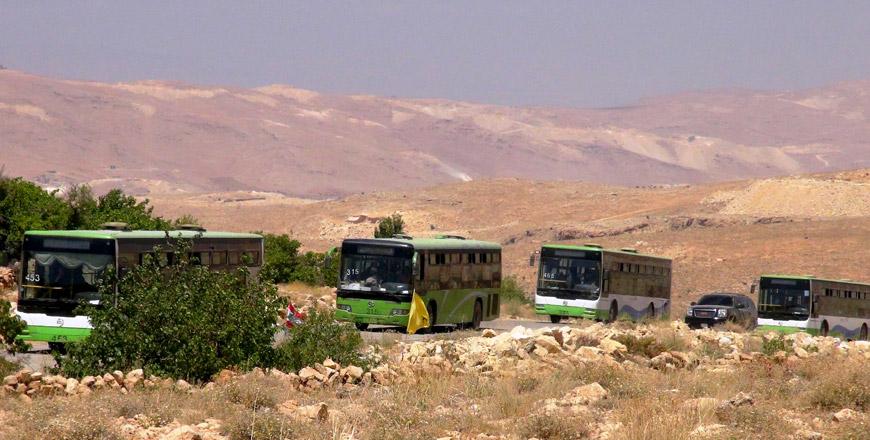You are here
Syrians evacuate Lebanese border camps for rebel-held territory
By Reuters - Aug 02,2017 - Last updated at Aug 02,2017

Syrian refugees are seen as they leave Lebanon after the ceasefire was announced between Hizbollah and Ahrar Al Sham in Arsal town of Baalbek, Lebanon, on Wednesday (Anadolu Agency photo)
BEIRUT — Buses carrying Syrian militants and refugees left a Lebanese border area bound for a rebel-held part of Syria on Wednesday, under a deal made after Shiite Hizbollah routed extremist Nusra Front insurgents in their last foothold at the frontier.
Some 7,000 Syrians including 1,000 militants, their families and refugees are to leave the Lebanese town of Arsal and the surrounding border area and head for Syria's northwestern Idlib province under the deal, Hizbollah-run media outlets said.
The transfer echoes deals struck within Syria in which Damascus has shuttled rebels and civilians to Idlib and other opposition areas. Such evacuations have helped President Bashar Assad recapture several rebel bastions over the past year, and are criticised by the opposition as amounting to the forced transfer of populations seen as sympathetic to the opposition.
The ceasefire took effect last week, just days after Lebanese Hizbollah and the Syrian army launched an offensive to drive Nusra Front and other militants from their last foothold along the Syria-Lebanon border.
The operation has highlighted the major role of Hizbollah in fighting militants along the frontier during Syria's six-year war, part of the much bigger role it has played across Syria in support of Assad.
Hizbollah's Al Manar television said that 113 buses had begun leaving Arsal town, headed for Fleita on the Syrian side.
At least 26 buses earlier left refugee camps in the nearby Jroud Arsal area and crossed to Wadi Hmeid further northeast in the direction of the Syrian frontier, it said, before their onward journey to Idlib.
Aid agencies with limited access to Arsal were not able to say where many of the Syrian refugees living in the area had originally come from.
Two former residents of Arsal said most refugees originally fled to Arsal when the Syrian army backed by Hizbollah took control of their towns across the border during heavy fighting over three years ago.
They said they were going to Idlib with many refugees feeling no longer safe to stay in Arsal camps after Hizbollah extended greater influence in the area while a return to government run-areas would also mean they risk being drafted into the army.
Abu Yahya Al Qalamouni who was in touch with several refugees said “many wanted to go to a camp where Hizbollah was not in control and not for love of Idlib”.
The UN refugee body said in a statement it was not party to the agreement and stressed that “return of refugees should be made free from undue pressure”.
“The UNHCR is not in a position to ascertain to what extent refugees, who are civilians by definition, are returning in this movement,” it said.
The deal included the release of eight Hizbollah fighters by the Nusra Front in exchange for individuals held by Lebanon. Three of the Hizbollah fighters were released overnight. The remaining five are expected to be released once the first convoy reaches its destination in Syria.
Last week, Hizbollah captured most of the mountainous zone of Jroud Arsal from the militants. It also has a strong presence on the Syrian side of the border where its fighters alongside pro-government militias maintain security in a string of Syrian towns and villages in the areas known as Western Qalamoun.
The Nusra Front was Al Qaeda’s Syria branch until it severed ties and rebranded last year. It now spearheads the Tahrir Al Sham Islamist alliance in the Syrian civil war.
Hizbollah role
The Lebanese army, which receives considerable US and British military support, did not take an active part in the operation, setting up defensive positions around Arsal.
The next phase is expected to focus on a nearby enclave currently in the hands of Daesh militants. Local media say the Lebanese army will likely wage that phase of the operation.
Hizbollah’s role in Syria’s conflict has been criticised by its Lebanese political opponents, including Prime Minister Saad Al Hariri, who is a Sunni.
Iran-backed Hizbollah, which has lost hundreds of fighters in Syria, says its fight is an existential one to stop extremists spreading to Lebanon. Its Lebanese critics say it has fuelled militant attacks in Lebanon.
The Arsal region witnessed one of the most serious spillovers of the Syrian civil war into Lebanon when Nusra Front and Daesh militants briefly overran the town of Arsal in 2014, abducting dozens of Lebanese soldiers and policemen.
Daesh is still holding nine Lebanese soldiers captured at that time. Their fate is unknown.
Related Articles
BEIRUT — Convoys of buses arrived on Monday to transfer thousands of Syrian militants and refugees from Lebanon's border region into rebel t
BEIRUT — Syrians who left Lebanon after a ceasefire between Hizbollah and Nusra militants on Thursday started crossing into a rebel-held are
BEIRUT — A group of Syrian rebels and refugees began to leave a border enclave in Lebanon for Syrian territory on Monday under a deal worked


















